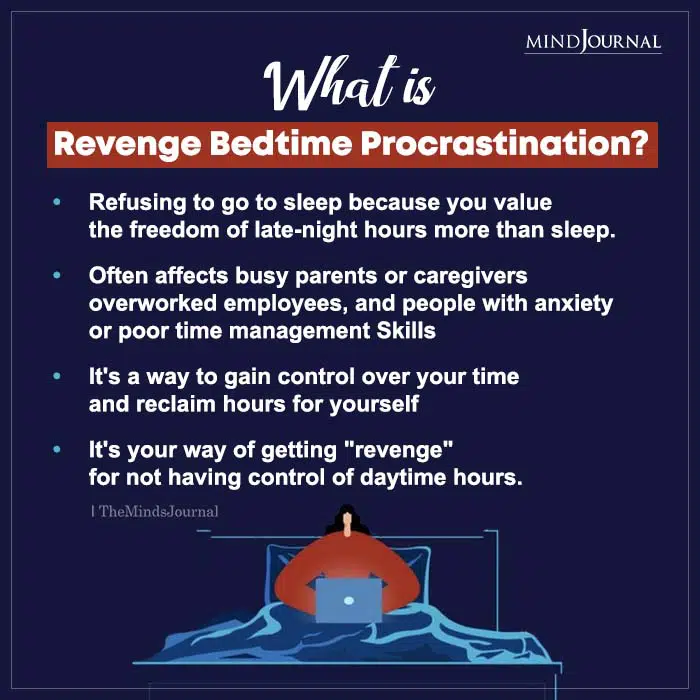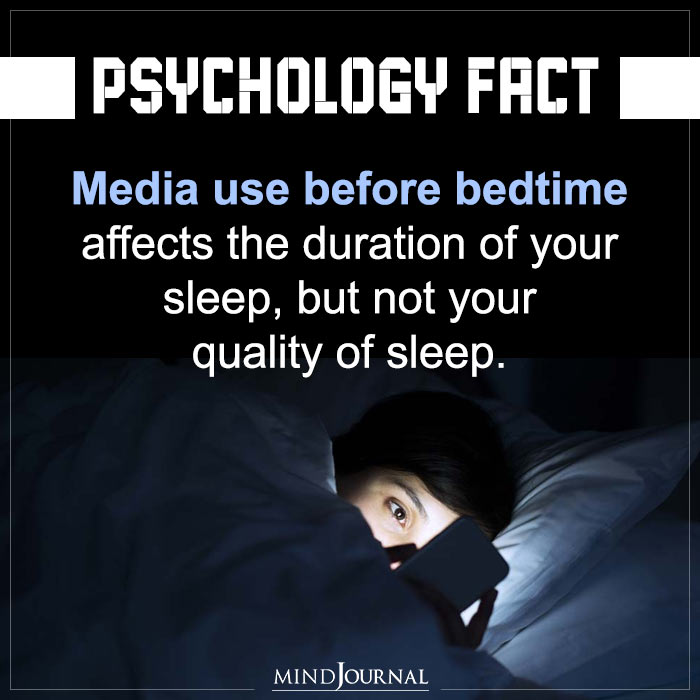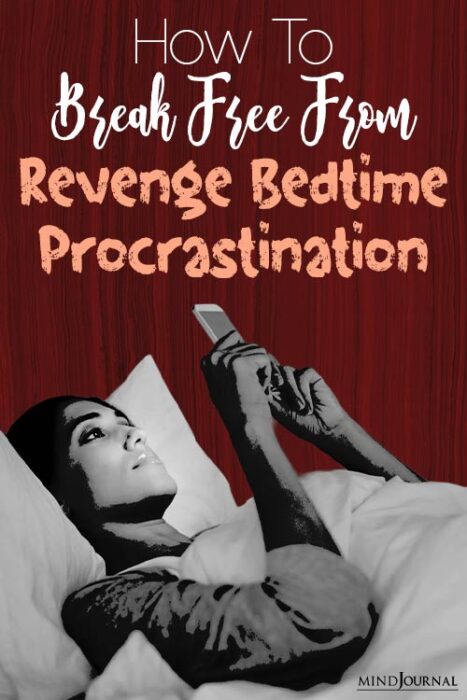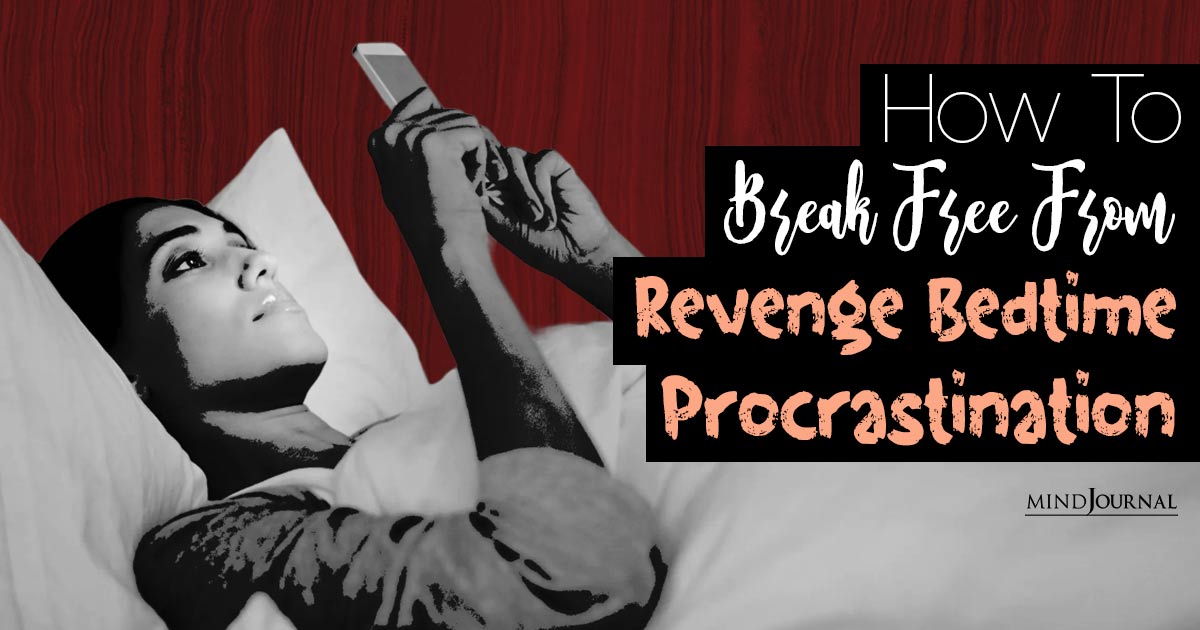Do you often find yourself staying up late into the night, even when you know you should be sleeping? If so, you may be caught in the grip of revenge bedtime procrastination. And that’s why it’s crucial to learn how to stop revenge bedtime procrastination.
So, grab a cozy blanket, settle into your favorite reading spot, and let’s find out what is revenge bedtime procrastination.
What is Revenge Bedtime Procrastination?
Revenge bedtime procrastination refers to the act of intentionally delaying sleep as a way to reclaim personal time that was lost during the day. It is a phenomenon that affects countless individuals seeking a precious balance between work, personal time, and rest.
Revenge sleep procrastination is a vicious cycle. It often occurs when individuals feel a lack of control over their schedules and sacrifice sleep to engage in leisure activities, such as –
- Binge-watching TV shows
- Scrolling through social media
- Indulging in late-night snacks
Although it may provide temporary satisfaction, revenge bedtime procrastination becomes an endless loop and leads to a chain reaction. It can have detrimental effects on physical and mental well-being.

Let’s unravel the secrets behind revenge bedtime procrastination and explore practical strategies to learn how to stop revenge bedtime procrastination, reclaim your sleep and prioritize self-care.
Related: Warning Night Owls: Is Staying Up Late At Night Bad For Your Mental Health?
Revenge Bedtime Procrastination symptoms
While revenge sleep procrastination can manifest itself in different ways in different individuals, here are some of the most common revenge bedtime procrastination symptoms that you should know about
- Difficulty falling asleep at a reasonable bedtime.
- Consistently staying up late despite feeling tired.
- Feeling a lack of control over bedtime and sleep habits.
- Sacrificing sleep to engage in leisure activities.
- Experiencing daytime sleepiness and fatigue.
- Impaired cognitive function and decreased productivity.
- Heightened stress levels and mood swings.
- Increased risk of developing chronic health conditions.
- Feeling trapped in a cycle of sleep deprivation and procrastination.
Reasons Behind Revenge Bedtime Procrastination
Several factors contribute to revenge sleep procrastination. One common reason is the pressure to optimize productivity during the day.
In today’s fast-paced society, we often feel compelled to squeeze every last drop of productivity out of our waking hours, leaving little time for relaxation and personal enjoyment. As a result, we try to compensate for this lost time by staying up late, even when we desperately need rest.
Another contributor is the allure of instant gratification. The activities we engage in during revenge bedtime procrastination, such as watching an exciting TV series or mindlessly scrolling through social media, provide immediate pleasure and momentarily distract us from the demands of daily life.
However, these activities can easily consume more time than intended, leaving us sleep-deprived and groggy the next day.
Now let us highlight the negative effects of this behavior pattern and find out how to stop revenge bedtime procrastination.
Read 8 Amazing Benefits Of Sleeping Naked, Backed By Science
Consequences of Revenge Bedtime Procrastination
While revenge bedtime procrastination may seem harmless at first, it can have serious consequences for our overall well-being. Some of the most common negative effects include –
- Sleep deprivation
- Impaired cognitive function
- memory retention issues
- Lack of creativity
- Reduced problem solving abilities
- Weakens the immune system
- Increases the risk of developing chronic conditions, such as heart disease, obesity, and diabetes.
Additionally, sleep deprivation can lead to heightened stress levels, mood swings, and decreased productivity, further perpetuating the cycle of revenge bedtime procrastination.
Related: 13 Terrifying Health Effects of Sleep Deprivation
How to Stop Revenge Bedtime Procrastination
The good news is that revenge bedtime procrastination can be overcome with the right mindset and practical strategies. Let’s explore some effective techniques to help you break free from this self-defeating behavior:
1. Setting Realistic Boundaries
Start by setting realistic boundaries around your time and activities. Prioritize your tasks and allocate specific time slots for work, leisure, and sleep. By consciously creating a balance, you’ll be less likely to succumb to revenge bedtime procrastination.
2. Establishing a Consistent Sleep Routine
Create a consistent sleep routine by going to bed and waking up at the same time each day, even on weekends. This helps regulate your body’s internal clock and promotes better sleep quality. This is how to stop revenge bedtime procrastination.
3. Creating a Restful Sleep Environment
Make your bedroom a sanctuary for sleep. Keep it dark, cool, and quiet. Remove distractions, such as electronic devices, and invest in comfortable bedding and a supportive mattress.
4. Practicing Mindfulness and Stress Reduction Techniques
Engage in mindfulness and stress reduction techniques before bed, such as meditation,deep breathing exercises, or journaling. These practices can help calm your mind and prepare your body for a restful night’s sleep.
5. Prioritizing Self-Care Activities
Make self-care a priority in your daily routine. Engage in activities that bring you joy, relaxation, and rejuvenation. This could include reading a book, taking a warm bath, practicing a hobby, or spending quality time with loved ones.
6. Utilizing Technology Mindfully
Be mindful of your technology use, especially before bedtime. Limit screen time and avoid stimulating activities that can interfere with sleep, such as watching intense movies or engaging in heated debates on social media.
Instead, opt for soothing activities like listening to calming music or practicing gentle stretching exercises. This is how to stop revenge bedtime procrastination.

7. Seeking Support and Accountability
If you find it challenging to break free from revenge bedtime procrastination on your own, seek support from friends, family, or even online communities.
Share your goals and progress with someone who can hold you accountable and provide encouragement along the way.
Tips for a Good Night’s Sleep
In addition to the strategies mentioned above, here are some quick tips for optimizing your sleep:
- Limit caffeine and alcohol intake, especially in the hours leading up to bedtime.
- Create a relaxing bedtime routine, such as reading a book or taking a warm bath.
- Avoid heavy meals close to bedtime, as digestion can disrupt sleep.
- Ensure your sleep environment is comfortable, clean, and free from distractions.
- Engage in regular physical activity during the day to promote better sleep.
- If you’re struggling with persistent sleep issues, consider seeking professional help from a sleep specialist.
Benefits of Overcoming Revenge Bedtime Procrastination
By actively working to overcome revenge bedtime procrastination, you open the door to a multitude of benefits. Improved sleep quality and quantity will enhance your overall well-being, boost your energy levels, and sharpen your focus and productivity during the day.
You’ll experience better physical and mental health, increased creativity, and a greater sense of balance and fulfillment in your life.
Related: Health Benefits Of Darkness: 4 Reasons Why You Should Sleep In The Dark, Not With The Lights On
Restoring Balance and Reclaiming Your Sleep
Revenge bedtime procrastination is a common struggle in today’s fast-paced world, but it doesn’t have to control your life. By understanding the underlying reasons, recognizing the consequences, and how to stop revenge bedtime procrastination, you can break free from this self-defeating cycle.
Remember, prioritizing your sleep and practicing self-care are essential for your physical, mental, and emotional well-being. So, bid farewell to revenge bedtime procrastination and embrace a well-rested future filled with balance, productivity, and fulfillment.
Your sleep—and your overall quality of life—deserves nothing less.
Frequently Asked Questions (FAQs):
Is revenge bedtime procrastination ADHD?
Revenge bedtime procrastination is not ADHD but can be seen in individuals with ADHD as a result of impulsivity and poor time management.
Is revenge bedtime procrastination a sleep disorder?
Revenge bedtime procrastination is not a sleep disorder; it’s a behavior where individuals delay sleep to reclaim personal leisure time.
Do procrastinators get worse sleep?
Procrastinators often experience poorer sleep quality due to stress, anxiety, and late-night work, affecting their overall sleep patterns and well-being.









Leave a Reply
You must be logged in to post a comment.